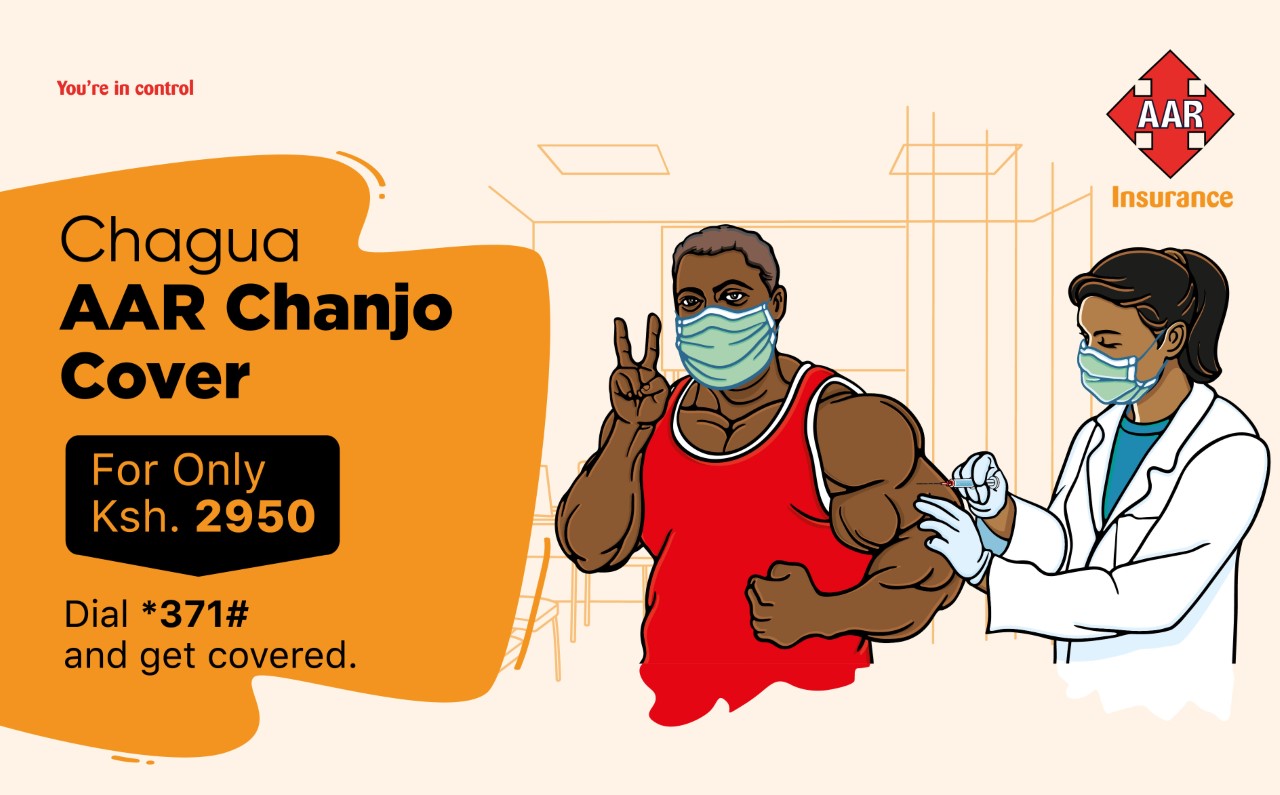In 2020 during first wave, Kenyan insurers agreed to continue covering the disease after consultations. Prior to the WHO’s declaration, an infected person could use their medical cover but this is didn’t last long with the Kenyan insurers. “The insurers will not be able to offer medical insurance cover for the condition at this moment. The insurers have this category of exclusion properly indicated in the policy documents,” Insurance Regulatory Authority chief executive Godfrey Kiptum .
AAR Insurance chief executive Nixon Shigoli said once a disease is declared a pandemic, the burden of medical care provision shifts from insurers to the government.
“Insurers now have to think very quickly but I haven’t heard of anyone in the industry who has included coronavirus in their medical offerings,” he said. He said if underwriters were to decide to introduce such a product it would likely be costly, meaning it wouldn’t meet its intended goal. “The truth is, we might introduce a product that caters to coronavirus but the uptake may not be as promising. Very few Kenyans are conscious enough to buy such a cover,” Shigoli said.
Even though after affirming not to involve the insurer in any cover case in relation to the pandemic, AAR popped up with ‘Chanjo cover’ from the moon. AAR Healthcare launched the ‘Chanjo’ insurance cover for patients suffering from extreme effects of Covid-19 vaccines within 60 days after getting the jab.
Individuals pay Sh2,950 for the insurance policy dubbed ‘Chanjo’, which has a limit of Sh500,000 for inpatient treatment. The vaccine insurance also offers a Sh500,000 last expense benefit in case of death and covers individuals aged between 18 and 60. Individuals register for the cover through the AAR mobile app or via the company’s website.
A cover in preparation of your demise as Marketing Manager- Special Projects, Pioneer Assurance, Antony Watene said their role as a life insurer is to provide the last expense cover in the event of death within 60 days after vaccination.
As of April 2021, Kenya’s Pharmacy and Poisons Board (PPB) announced that 279 people reported suffering adverse effects after taking the Oxford-AstraZeneca coronavirus vaccine.
Out of the 279 reported cases, 272 were mild and resolved within a short period. 339,893 people vaccinated with vaccine in Kenya at the time of the report.
Like any vaccine, COVID-19 vaccines can cause mild, short term side effects, such as a low-grade fever or pain or redness at the injection site. Most reactions to vaccines are mild and go away within a few days on their own without seeking medical attention.
More serious or long-lasting side effects to vaccines are possible but extremely rare. These said effects vary from headaches, fever, nausea, fatigue, excessive sweating and so on of which most clear within two days.
There’s no case of serious rare side effects of AstraZeneca jab that have resulted to loss of life in Kenya as per the officially reported cases of which have just been mild and disappears. But there are reported fatality in other countries across the world that have resulted from the adverse effects of the COVID 19 jabs especially the rare-blood clot.
Like for example, in UK as of March According to data from the Medicines and Healthcare products Regulatory Agency (MHRA), up to and including 31 March 2021, there were 79 UK reports of blood clotting cases alongside low levels of platelets among people given the AstraZeneca vaccine. Nineteen of those people died. By that date 20.2m doses of the AstraZeneca vaccine had been given in the UK, meaning the overall risk of these blood clots is approximately four people in a million who receive the vaccine.
In a turnaround of events, their advertisement of the cover turned sour as Kenyans took them head on on social media , a confrontation which included Dr. Githinji Gitahi, MBS who called on the insurer’s unethical move terming it commercial callousness for fear mongering and profiling AAR as Antivaxxer. “Is @AAR_Insurance an #antivaxxer or just looking to create fear and make profit? What commercial callousness is this? We are working to save lives and your insurer is working to make money by creating fear! Must be a first in the world @MOH_Kenya #AARantivaxxer.”
Which in response, the insurer argued, “The vaccines approved by the World Health Organization (WHO) & the Ministry of Health are SAFE. AAR Chanjo cover is meant to bring comfort to those worried about developing any side effects. It is meant to cover Kenyans in the UNLIKELY event of adverse reactions.”
But Githinji shot the last bullet of which haven’t been answered , “And is it true that you don’t cover for COVID illness? Do you cover your members for these side effects you want to sell cover for to others? Could you please share a list of these side effects and how you will determine they are COVID vaccine? What’s your criteria?”
Other comments –
“Shame on you!! Whereas other Insurance companies are providing medical cost waivers, donating funds to at risk families and funding mass education programs y’all are looking for ways to profit off a pandemic and spread fear. C’mon Shape up!”
“Do they outweigh the side effects of being unvaccinated and catching C-19? What do your actuaries say about the chances of needing hospitalisation for the ‘side effects’ of C-19 vaccination?”
“The Insurer creating fear to sell a policy is unethical if you wanted have the cover just give it for free to all your existing medical policyholders as a sign of encouraging them get vaccinated ,otherwise having it as independent policy to sell amid a pandemic is unethical.”
“Your focus on rare events is really not warranted. You are planning to make money on something that will rarely happen. And the message you are sending is not the correct one . You should put a package to support people from the impact of COVID”
“Everyone seems to have an agenda to push these days. You don’t become an anti-vaxxer just by acknowledging THE FACT that vaccines have side effects. No need to lynch AAR, if you are not the vaccine manufacturer.”
A serious outburst that drew attention of Ministry of Health who in response cautioned the unsuspecting customers and the general public against money laundering initiative by the insurer.
“Our attention has been drawn to posts/advertisement circulating in social media by an Insurance company alleging that they are offering to cover for “adverse side effects” arising from Covid-19 vaccinations. The Ministry of Health wishes to state that insurance against side effects is not only unnecessary but unethical. No company should claim to provide insurance services against vaccine side effects or
side effects of any medicine. An advertisement of such services is misleading to the public & creates unnecessary anxiety among people who are already at risk of severe Covid-19 disease. All vaccines deployed for COVID-19 vaccination in Kenya have received both WHO and Kenya Pharmacy and Poisons Board Emergency Use Listing. These vaccines have been evaluated and found to be safe for use to combat the Covid-19 pandemic.”
If AAR can’t cover the Covid19 bill and decides to invest in a portfolio that it absolutely ripping big as there are no serious cases of side effects being reported. Pushing its clients to pay more and fear mongering the public skepticism – to register for the Chanjo cover as a precautionary measure is totally against healthcare system as far as ethical considerations and extortion is concerned.
There’s a possibility of a marketing strategy that AAR could be using media influencers to profile death cases related to Covid19 to be as a resultant of the adverse effects to push their cover narrative and discredit Government of the day. Downplaying Law of attraction (You attract what you think) in Psychology to their personal interest to make money – they’ve been pushing side effects narrative that psychologically inflicts fear into making everyone believe that chances of being a victim is 5 in 10 hence creating phobia.
Instead of AAR encouraging the public not to worry of side effects which according to WHO, CDC are normal signs that your body is building protection, they’re out to push a narrative that should feel side effects – get to the hospital when maybe all one requires is just rest.
The ball is now in the court of Insurance Regulatory Authority (IRA) to exercise its mandate and do its due diligence in solving the matter which no longer has no public faith.
Kenya Insights allows guest blogging, if you want to be published on Kenya’s most authoritative and accurate blog, have an expose, news TIPS, story angles, human interest stories, drop us an email on [email protected] or via Telegram

 Investigations1 week ago
Investigations1 week ago
 Business2 weeks ago
Business2 weeks ago
 Investigations1 week ago
Investigations1 week ago
 Investigations1 week ago
Investigations1 week ago
 Investigations1 week ago
Investigations1 week ago
 Opinion2 weeks ago
Opinion2 weeks ago
 News2 weeks ago
News2 weeks ago
 Investigations1 week ago
Investigations1 week ago


















